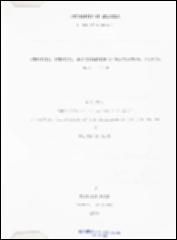| dc.contributor.author | Khan, Nyla Ali | |
| dc.date.accessioned | 2020-09-07T17:00:18Z | |
| dc.date.available | 2020-09-07T17:00:18Z | |
| dc.date.created | 2000 | |
| dc.date.issued | 2000 | |
| dc.identifier.uri | https://hdl.handle.net/11244/325436 | |
| dc.description | Thesis (M.A.)--University of Oklahoma, 2000 | |
| dc.description | Includes bibliographical references (leaves 89-94) | |
| dc.description.abstract | In this thesis, I have attempted to provide an explanation of various interrelated topics that are placed under the rubric of postcolonialism. My analyses of Salman Rushdie's 'Satanic Verses' and Sara Suleri's 'Meatless Days' entail and exploration of their respective positions as expatriates which empowers them to negotiate the space between two cultural realities.
The formerly colonized population of South Asia constituted the space in which conflicting discourses had been written and read. Colonial powers reconstructed cultural notions of the formerly colonized in image and word to emphasized the bias that reinforced the propagandist agenda of the hegemonic powers. This populace had an ambivalent role in its complicity with and resistance to the forces that jeopardized its existence.
An application of various theoretical and methodological approaches has enabled postcolonial writers to analyze the processes and aftermath of the incursion to which colonized territories had been subjected in order to formulate structures of cultural critique and cultural logic. The use of such theoretical and methodological approaches elucidates the development of critical projecst to expound on the relationship between ideological values and interpretive practice, which is responsible for either the depletion or the perpetuation or the hybridization of a culture.
I have attempted to explore the variability of the spaces that postcolonial subjects occupy, in which diverse possibilities of interpretation are generated by the competing discourses of the hegemonic order; a nationalism that is created by an indigenous elite; and a cultural hybridity that repositions the postcolonial subject. Rushdie's focus on the position of South Asian immigrants in England proclaims a reinscription of rigid dichotomies as the prerequisite to regeneration. Suleri's avows a similar reinscription of postcolonial identities, but her portrayal of entities in the formerly colonized culture of the Indian subcontinent is not reductive nor does she obscure pre-colonial literary and cultural forms. Both these writers revive the genre of fragmented history in order to formulate a "viable alternative to the deadlock of Manichean binaries."
Rushdi and Suleri employ visibly different methods of including the repressed voice from the non-European world in order to foreground the cultural and historical perspective which is "other" to Europe. These two texts strive to reform the exclusionary and assimilationist tactics of the former colonizer. This strategy enables postcolonial writers to put forth their cultural knowledge as an oppositional discursive system that would generate a dialectical interplay. These writers recognize the centrality of certain non-Western epistemologies that have been diminished as "marginal" by the West. Rushdie is unable to assume as clinical an attitude in relation to the norm of Western reasoning as Suleri, who clearly engages with historicized and contextualized South Asian knowledge systems.
I have endeavoured to elucidate this re-etching of hierarchical structures that does not validate either the marginalization of the East or the construction of an inverse hierarchy that vents its wrath by rendering Western knowledge and culture as "other". | |
| dc.format.extent | viii, 94 leaves | |
| dc.format.medium | viii, 94 leaves ;
29 cm. | |
| dc.language.iso | eng | |
| dc.subject.lcsh | Postcolonialism--Fiction | |
| dc.title | Hybridity, identity, and migration in postcolonial fiction and criticism | |
| dc.type | Text | |
| ou.group | Department of English | |
